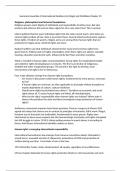Samenvatting
Samenvatting Essentials of International Relations Chapter 10, ISBN: 9780393977226 Introduction to international relations (7321M127LY)
- Instelling
- Universiteit Van Amsterdam (UvA)
Dit is een samenvatting van essentials of international relations Chapter 10
[Meer zien]




